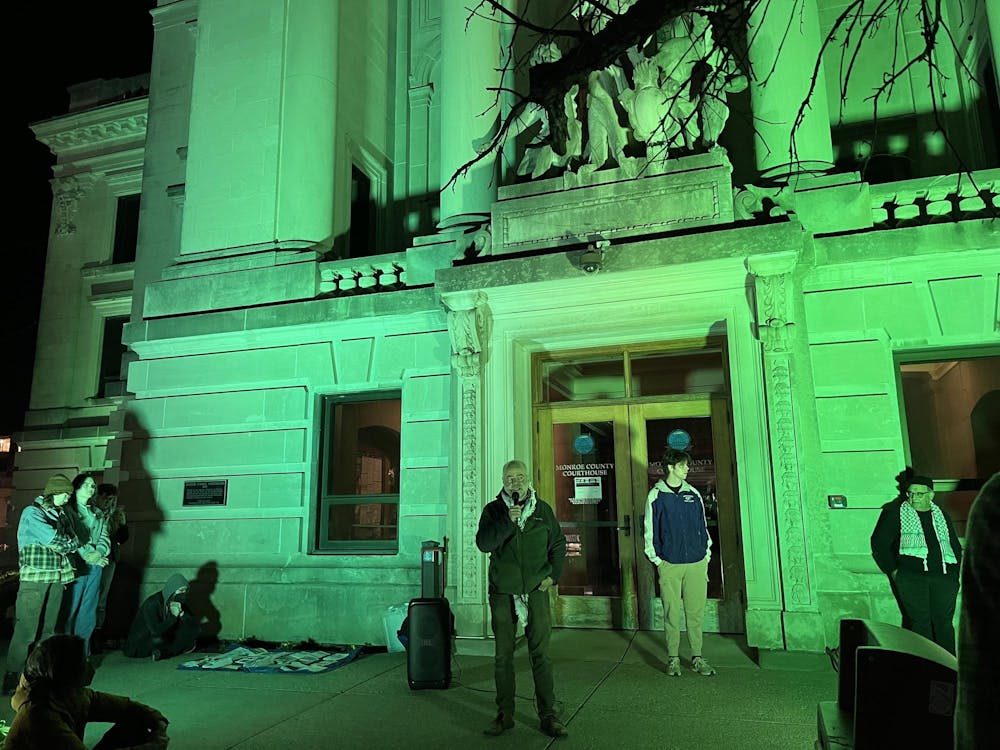Around 50 people gathered Friday night on the steps of the Monroe County Courthouse to protest IU’s Expressive Activity Policy.
Organized by two high school students, the protest intended to show how IU’s policies affect the community at large and demonstrate continued support for pro-Palestinian causes.
IU’s expressive activity policy limits when “expressive activity” is allowed on campus to between 6 a.m. and 11 p.m. every day; prohibits camping at any time of day; prohibits impeding vehicle and pedestrian traffic and building entrances; and requires signs and temporary structures to be approved at least 10 days in advance by the university. Many groups resisted the new policy when it was passed in July.
Siddhu McLeod, Bloomington High School South senior, organized Friday’s protest with his friend and fellow senior, Lewis Robinson.
“We need some more involvement from the community,” McLeod said. “And especially myself and Lewis, as high school students, our voices are different because we’re prospective students, and we want to talk about how this affects the community at large rather than just students and faculty.”
Both feel that the expressive activity is harmful to students and community members.
“This is blatant silencing of our voices,” Lewis Robinson said.
During the hour-long protest, there were speeches from McLeod and Robinson, as well as several activists. Dan Segal from Jewish Voices for Peace, the world’s largest Jewish organization advocating for Palestinian independence from Israel, told the crowd that achieving true free speech and faculty governance at IU will be a marathon, not a sprint.
“This same struggle is happening on campuses all across the country because the elites of our universities and colleges cannot bear having pro-Palestinian speech, so they are cracking down everywhere,” Segal said.
Many members of the crowd wore striped keffiyehs, which are often worn as a symbol of Palestinian identity and resistance, and several held signs. One read, “Rest in Peace Dunn Meadow,” in reference to the closure of Dunn Meadow since August for renovations. “When I’ve got something to say, I’m gonna say it now,” said another sign. During the speeches, protesters alternately cheered and beat drums in agreement or booed when IU President Pamela Whitten or IU administration’s actions were mentioned.
“This policy takes aim at our fundamental rights, and it does it without consultation,” Ben Robinson, Lewis’ father and an associate professor of Germanic Studies at IU, told the crowd. Robinson was arrested during the encampments last fall and is now a plaintiff in a lawsuit against the expressive activity policy.
He called the rule forbidding speech after 11 p.m. “the most pernicious part” of the policy. He also called out the rules requiring protest to be at least 25 feet from entries and exits, restrictions of vertical signage, and requirement of approval for protest from a committee, with no details on this committee. The policy also does not include any section calling for IU to avoid using force if possible, which the old policy included.
“It is filtering speech; it’s deciding who gets to say what and who gets to put their opinions at the forefront,” IU freshman Ava Rose said. “And that’s not fair; it’s not just or right.”
Among their grievances, the protesters listed the decrease in funding for IU’s Center for Research on Race & Ethnicity in Society, which researches race and ethnicity. They also discussed the use of the Indiana State Police to arrest protesters in April and compared the response to IU’s lack of action in similar circumstances. IU Professor Barbara Dennis referenced a pastor who preached against the LGBTQ+ community on campus last year. She said the university did nothing against this demonstration of free speech, while pro-Palestinian protestors at Dunn Meadow were forcibly arrested.
“I believe then and now that free speech forges a dialogue with, through and across difference as a path to understanding peace, compassion and moral development,” she said. “It’s something to cherish and nourish, not something to fear or stifle.”



